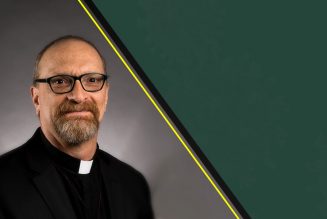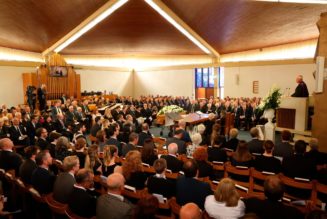
COMMENTARY: The measured response from the pope emeritus to the attacks on his character makes for effective spiritual reading.
For more than 70 years as a priest, Joseph Ratzinger set for himself the mission of seeking and proclaiming the truth; he chose “cooperators of the truth” as his episcopal motto. He did just that in his response to the Munich inquiry in sexual abuse, defending the facts of the matter against prevailing opinion, and elevating the entire matter by placing it in the liturgical context of sin, contrition, judgment and salvation.
Pope Emeritus Benedict XVI contested the report of the German law firm that conducted the inquiry, with his legal team arguing that the facts did not support the findings. They argued that the inquiry itself acknowledged a “lack of evidence,” and thus put forward their own judgment of what was “most likely.” Their opinion, absent a defense and untested in any court, does not establish the truth.
Veteran Vatican observer John Allen noted that Benedict did not follow the public-relations “playbook,” in which bishops do not contest the findings of such inquiries, even when some of their claims are obviously false or exaggerated, as was the case in Pennsylvania in 2018 and France in 2021.
Joseph Ratzinger never followed the playbook when it came to public relations. While almost all bishops in the world waited until after media scandals to act against sexual abuse, it was Cardinal Ratzinger who led the key Vatican reforms that were put in place the year before the Boston scandals hit.
Now, when it is unfashionable to insist on due process in regard to sexual-abuse cases and to examine allegations precisely, Benedict does not blow with the public-relations winds.
“I think it is right that he should vindicate his truthfulness, because it is a characteristic of his personality and his behavior throughout his life,” said Jesuit Father Federico Lombardi, who served as press spokesman for Benedict during his papacy. “I can also testify, having lived close to him as a collaborator for several years: The service of truth was always in the first place. He never tried to conceal things that could be painful for the Church to acknowledge; he never tried to give a false image of the reality of the Church or of what is happening. So I absolutely believe that one cannot doubt in any way his truthfulness. And he attests to this, and I believe it is right to accept it with confidence and conviction.”
The Catholic Church in Germany is undergoing a profound crisis at the moment, with the sexual-abuse crisis being exploited by powerful lobbies to advance heterodox positions as part of the “Synodal Way.” In that context, the unusual attention given to Ratzinger’s less than five years as archbishop of Munich, more than 40 years ago, is understandable. Attacking Ratzinger in Germany is a means to the end of undermining Catholic orthodoxy.
Unsurprisingly, Benedict responded with orthodoxy in a liturgical key, placing his long service in the Church in the context of a sinner standing before the Lord. In another departure from the “playbook,” Benedict spoke as a Christian disciple and pastor, not the manager of a besieged corporate entity, as is customary in the German episcopate.
“I am increasingly struck by the fact that day after day the Church begins the celebration of Holy Mass — in which the Lord gives us his word and his very self — with the confession of our sins and a petition for forgiveness,” Benedict wrote. “We publicly implore the living God to forgive [the sins we have committed through] our fault, through our most grievous fault. … Yet every day they do cause me to question if today too I should speak of a most grievous fault. And they tell me with consolation that however great my fault may be today, the Lord forgives me, if I sincerely allow myself to be examined by him, and am really prepared to change.”
Referring to his meetings “with victims of sexual abuse by priests,” Benedict writes “that we ourselves are drawn into this grievous fault whenever we neglect it or fail to confront it with the necessary decisiveness and responsibility, as too often happened and continues to happen.”
Benedict then turned to one of his favorite biblical images for understanding the life of the Church, that of Jesus asleep in the boat while the storm threatens. He employed it in his final general audience as pope in 2013. This time, Benedict says, it is the apostles who sleep while Jesus suffered his agony in Gethsemane, a suffering which includes the pain of sexual-abuse victims.
“I have come increasingly to appreciate the repugnance and fear that Christ felt on the Mount of Olives when he saw all the dreadful things that he would have to endure inwardly,” Benedict writes. “Sadly, the fact that in those moments the disciples were asleep represents a situation that, today too, continues to take place, and for which I too feel called to answer.”
Finally, Benedict reminds his readers that the judgment of a Munich law firm is to be noted, but not to be feared. Fear and trembling are reserved for matters far weightier than the unseemly squabbles of bitter German ecclesiastical politics.
“Quite soon, I shall find myself before the final judge of my life,” the nearly-95-year-old wrote. “Even though, as I look back on my long life, I can have great reason for fear and trembling, I am nonetheless of good cheer, for I trust firmly that the Lord is not only the just judge, but also the friend and brother who himself has already suffered for my shortcomings, and is thus also my advocate, my ‘Paraclete.’ In light of the hour of judgment, the grace of being a Christian becomes all the more clear to me. It grants me knowledge, and indeed friendship, with the judge of my life, and thus allows me to pass confidently through the dark door of death.”
Benedict’s letter has been dismissed by activists, parsed by lawyers, examined by the court of public opinion. Those are inadequate categories. It is more fitting as spiritual reading.
Join Our Telegram Group : Salvation & Prosperity









